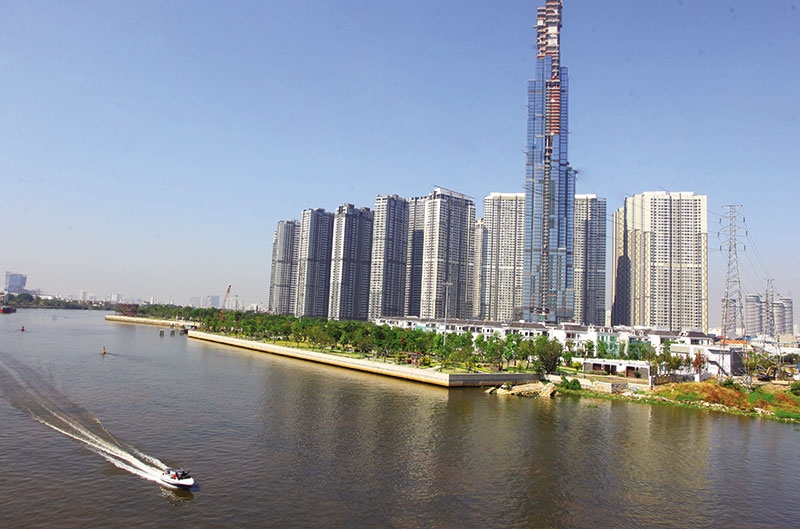Realty giants rake in foreign billions
 |
| Domestic developers like Vinhomes and Novaland are attracting foreign investors willing to pay big money for shares |
Last month, Vinhomes JSC, the real estate arm of domestic conglomerate Vingroup JSC, attracted a slew of overseas investors to its pre-listing share sale. The foreigners, who together bought 15 per cent of shares, include Singapore’s sovereign wealth fund GIC, Avanda, Capital International, Capital Research, JP Morgan Asset Management, Mirea Assets, and Waddell and Reed, as well as existing Vietnam-based investment funds such as Dragon Capital, VinaCapital, and Korea Investment Management.
Coughing up $1.3 billion for 5.74 per cent of shares, GIC was the biggest spender and became Vinhomes’ largest foreign shareholder. Vinhomes CEO Nguyen Dieu Linh told VIR that foreign investors were impressed with the residential ecosystem of Vinhomes, as the firm puts in significant efforts to build up an entire urban area around its apartment projects.
“We’re targeting the affordable housing segment, the demand for which is rising quickly. With VinCity, we want to reduce congestion problems in the inner areas of Hanoi and Ho Chi Minh City and provide housing for urban dwellers,” said Linh.
The CEO noted that most foreign investors that signed up with Vinhomes have substantial real estate experience, so they can offer great insights for the firm in addition to the capital. After its market debut on May 17, Vinhomes is now the second-largest company on the Ho Chi Minh City Stock Exchange, with market capitalisation of $13.5 billion, just behind its parent firm Vingroup.
Recently, another major developer, Novaland JSC, raised $160 million from convertible bonds in Singapore, attracting more than 20 institutional investors from abroad. Previously, the firm also pocketed another $150 million from a top-up share sale, which means it has collected a total of $310 million from international markets.
Underwriter and advisor Credit Suisse told VIR that Novaland’s transactions received a positive reception, particularly from international investors, due to the firm’s strong fundamentals and Vietnam’s growing capital market. With the capital raised through this landmark transaction and Novaland’s land bank located in prime strategic locations, it is well poised for future growth.
“Novaland is recognised by foreign investors as having the best exposure to the growing affluence of the country’s middle class and its consumption potential,” said Credit Suisse’s representative.
In April 2018, Cenland, another up-and-coming real estate group, reported that investment funds Dragon Capital and VinaCapital had become its strategic shareholders with 25 per cent of shares in total. Cenland expects to float its shares on the stock exchange within the second quarter of 2018.
It is notable that investment funds are pouring capital into real estate firms in affordable segments. VinaCapital, for example, announced that after years of developing projects on its own, the fund now prefers to buy stakes in leading Vietnamese property firms.
Dragon Capital, similarly, has been investing in a series of real estate firms including Hai Phat Invest and Van Phu Invest. It is also reported to be targeting other mid-sized firms such as SonKim Land and MB Land, as these developers seek further capital on their way to the listed market.
According to reports by CBRE Vietnam, in 2017, mid-range segment products took up 64 per cent of new supply, up by 14 per cent from 2016. The offer price in this segment also grew by 5 per cent, compared to the market average of 3 per cent. CBRE Vietnam forecasts that between 2018 and 2020, the supply and offer prices of mid-range segment products will rise slightly, fuelling the growth of developers that focus on affordable products.
According to Nguyen Hong Khanh, head of research at Sacombank Securities, foreign investors are excited about the prospects of the real estate sector in Vietnam due to fast urbanisation rates, the rise of middle-income customers, and worsening congestion in bigger cities. Leading developers boast vast land banks, prime locations, high construction speeds, and well-prepared marketing programmes, said Khanh, which cements their appeal to investors abroad.
What the stars mean:
★ Poor ★ ★ Promising ★★★ Good ★★★★ Very good ★★★★★ Exceptional
Related Contents
Latest News
More News
- Saigon Centre gains LEED platinum and gold certifications (February 12, 2026 | 16:37)
- Construction firms poised for growth on public investment and capital market support (February 11, 2026 | 11:38)
- Mitsubishi acquires Thuan An 1 residential development from PDR (February 09, 2026 | 08:00)
- Frasers Property and GELEX Infrastructure propose new joint venture (February 07, 2026 | 15:00)
- Sun Group led consortium selected as investor for new urban area (February 06, 2026 | 15:20)
- Vietnam breaks into Top 10 countries and regions for LEED outside the US (February 05, 2026 | 17:56)
- Fairmont opens first Vietnam property in Hanoi (February 04, 2026 | 16:09)
- Real estate investment trusts pivotal for long-term success (February 02, 2026 | 11:09)
- Dong Nai experiences shifting expectations and new industrial cycle (January 28, 2026 | 09:00)
- An Phat 5 Industrial Park targets ESG-driven investors in Hai Phong (January 26, 2026 | 08:30)

 Tag:
Tag:




















 Mobile Version
Mobile Version